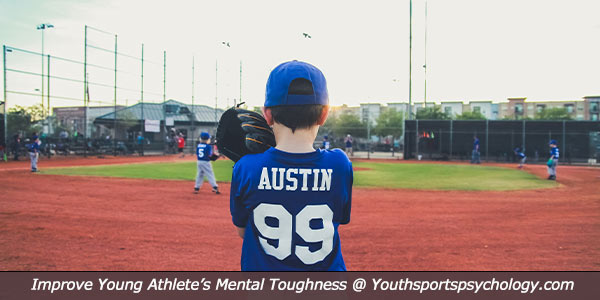Teach Athletes Strategies to Control Their Thinking
Are your sports kids anxious during stressful moments while they’re competing? Are they generally anxious as athletes?
Why do so many athletes feel anxious during competitions?
Two issues contribute to anxiety in sports.
First, young athletes label themselves as anxious. When this happens, it often becomes reality. They feel helpless to change or manage anxiety. They become prisoners of their anxiety.
For instance, anxious athletes rarely perform well under pressure. If tennis players label themselves as anxious, they will expect to be anxious and choke under pressure.
A second issue for young athletes is the belief that they can’t control their emotions. But the truth is, they can control their feelings, but not the situation. If kids believe they can’t control their negative emotions during a game, it increases their anxiety.
A pitcher who gives up a tying home run in the ninth inning will understandably become angry, frustrated or agitated. Those emotions are normal. The goal for the pitcher is to regain composure and focus on the next batter.
How can kids manage their emotions during games or competitions?
If kids can become anxious, then they can also become relaxed or composed.
In other words, they can control their feelings using some mental game strategies.
Kids can re-interpret the situation, challenging their thoughts. Or they can utilize a relaxation strategy.
When sports kids apply these simple strategies, they can feel they are capable of rising to competitive challenges with confidence.
PGA golfer Hideki Matsuyama won the 2021 Masters tournament, his first major championship victory. Heading into the final day of the tournament, Matsuyama was winning by four strokes and was very nervous at the start of the round.
“My plan this morning was to wake up about 9:30, but needless to say, I arose much earlier than that and couldn’t go back to sleep,” said Matsuyama. “So, I came to the golf course early. Had a really good warm-up. I felt really good going to the first tee, until I stood on the first tee, and then it hit me that I’m in the last group of the Masters Tournament, and I’m the leader by four strokes. And then I was really nervous.”
Despite his nerves, Matsuyama was able to keep his composure, manage his strong emotions and win by one stroke.
Kids have the capacity to manage their emotions in any competitive situation. They are the directors of their experience.
To manage anxiety during games or competitions, it’s important for kids to first realize that most anxiety is about fear of failure and worry about outcomes such as the score or win. When sports kids worry about losing or embarrassing themselves, they will feel anxious.
Next, kids should embrace the pressure of the moment.
How kids interpret the pressure is up to them. They should try to put competition into perspective and know this will not be the last competition they’ll have. They’ll have many other opportunities. They need to let go of thinking about the outcome and the consequences of the outcome.
Help kids learn from these mental game strategies and manage their anxiety. They’ll have more fun and feel more confident!
Related Articles on Youth Sports:
- When Youth Sports Feels Toxic, Athletes Need These Skills
- How Choking Hurts Athletes’ Performance
- Helping Kids Stop Criticizing Their Game
*Subscribe to The Sports Psychology Podcast on iTunes
*Subscribe to The Sports Psychology Podcast on Spotify
The Composed Sports Kid

“The Composed Sports Kid” audio and workbook digital download program for young athletes and their parents or coach helps kids cope with frustration and anger in sports. Help your sports kids learn how to manage expectations and let go of mistakes so they can keep their head in the game.
The Composed Sports Kid system is really two programs in one–one program to train parents and coaches how to help their kids practice composure, and one program that teaches young athletes–ages 6 to 13–how to improve composure, let go of mistakes quickly, have more self-acceptance, and thus enjoy sports more!

